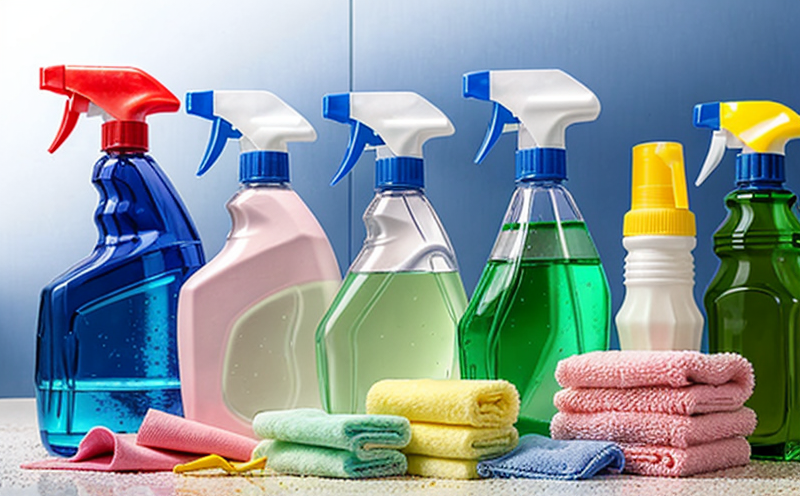Cleaning Products & Detergents Testing
The testing of cleaning products and detergents is a critical aspect of ensuring consumer safety and product quality. As a specialized laboratory, we provide comprehensive services to help manufacturers, distributors, and retailers meet regulatory requirements and ensure their products are safe for use.
Our testing encompasses a wide range of parameters that are essential in the development, quality control, and compliance verification processes. This includes assessing the cleaning efficacy, biodegradability, pH levels, chemical composition, and potential allergen content. By providing this service, we play a pivotal role in maintaining public health and safety.
Biodegradability is one of the key tests performed on detergents to ensure they do not harm the environment when released into it. This test measures the extent to which a substance can be broken down by microorganisms under specific conditions. According to ISO 14855, this process should be completed within a specified timeframe to pass.
Another critical parameter is the pH level of cleaning products. The correct pH balance ensures that the product works effectively without causing irritation or damage to surfaces and skin. ASTM D1293 provides guidelines on how to measure the pH levels accurately. In addition, we can also assess the potential for allergens in cleaning products, which is crucial for companies targeting sensitive consumers.
Our testing process begins with a thorough review of the product specifications and intended use. This information helps us tailor our tests to meet the specific needs of each client. Once this initial step is completed, we proceed with specimen preparation, ensuring that the samples are representative of the products in question. We then employ state-of-the-art instrumentation to perform various tests, including but not limited to microbiological analysis and chemical profiling.
Microbiological analysis involves examining the presence of bacteria, fungi, or viruses that might indicate contamination or spoilage. This is particularly important for products like soaps and shampoos where microbial growth can lead to health risks if not properly controlled. Chemical profiling helps identify all components present in a cleaning product, which is vital for ensuring compliance with various international standards such as EN 14872.
The results of these tests are meticulously analyzed by our team of experts who possess extensive experience in the field. They then provide detailed reports that outline any issues found during testing along with recommendations for improvement if necessary. These reports serve multiple purposes including aiding R&D teams in refining formulas, helping compliance officers understand potential pitfalls, and assisting quality managers in maintaining consistent product quality.
- Biodegradability: Ensures that the cleaning product does not harm aquatic life or contribute to pollution.
- pH Levels: Guarantees effective yet gentle performance on both users and surfaces.
- Allergen Content: Helps companies cater better to individuals with sensitivities, thus enhancing overall customer satisfaction.
Customer Impact and Satisfaction
Testing cleaning products is not just about compliance; it’s also about enhancing customer trust and satisfaction. By ensuring that our clients’ products meet the highest standards of safety and effectiveness, we contribute directly to their reputation and market share.
Our tests help companies avoid costly recalls by identifying potential hazards early on in the production cycle. This proactive approach allows manufacturers to correct any issues before they reach consumers, thereby protecting both brand integrity and consumer confidence. Furthermore, our testing supports innovation by offering insights into which areas of improvement could yield significant benefits.
For quality managers, compliance officers, and R&D engineers specifically involved in cleaning product development, these tests offer valuable data that can guide strategic decisions regarding formula adjustments or new ingredient sourcing. The information gained from rigorous testing enables them to stay ahead of industry trends while also addressing emerging concerns related to environmental impact.
Customer satisfaction plays a crucial role in maintaining long-term relationships with clients and ultimately drives business growth. By delivering high-quality testing services, we empower our partners to create products that not only comply with regulations but also exceed customer expectations. This dual focus on compliance and excellence ensures lasting partnerships built on mutual trust and respect.
Environmental and Sustainability Contributions
- Reduction of Waste: Testing helps identify ingredients that could cause unnecessary waste during manufacturing processes, promoting more efficient resource use.
- Enhanced Recycling Potential: By ensuring products are biodegradable and free from harmful chemicals, we encourage better recycling practices across industries.
- Avoidance of Harmful Chemicals: Our rigorous testing ensures that only safe and sustainable alternatives find their way into final formulations.
Incorporating environmental considerations into our testing protocols allows us to contribute positively towards global sustainability goals. Through these efforts, we aim to reduce the overall ecological footprint associated with cleaning product manufacturing and usage worldwide.
Use Cases and Application Examples
Our Cleaning Products & Detergents Testing service finds application in several key areas:
- New Product Development: Early-stage testing ensures that new products are safe, effective, and environmentally friendly.
- Quality Assurance: Regular testing helps maintain consistent quality across batches of production runs.
- Regulatory Compliance: Ensures that all cleaning products meet relevant national and international standards.
In the realm of new product development, our tests play a vital role by providing early feedback on potential issues. This allows for timely adjustments in formulation to prevent costly mistakes later down the line. For ongoing production lines, regular testing ensures that each batch consistently meets quality benchmarks. And finally, regulatory compliance is crucial to avoid legal complications and maintain good standing within the industry.
Real-world examples include a major household goods company seeking certification under EU directives for its new laundry detergent range. Our team conducted extensive testing over several months before issuing final approval. Another instance involves an American firm looking into reducing the carbon footprint of their dishwashing liquids by reformulating with biodegradable surfactants. Again, our comprehensive tests provided critical data that guided this successful transition.





